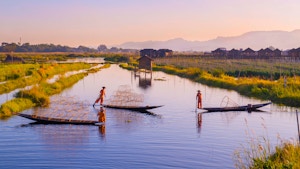Laos News

Carbon & Climate
Southeast Asia’s highly anticipated environmental rights declaration ‘watered down’, say critics
Civil society groups express concern over the draft declaration’s failure to adequately acknowledge “Indigenous peoples”, among other shortcomings.

Carbon & Climate
Investors push for carbon pricing mechanisms, but developers resist
Regulation is a crucial factor that investors consider before funding carbon projects, experts said at a recent event in Malaysia. Developers argue that the system does not need to be perfect to kickstart projects.

Carbon & Climate
Malaysia proposes Asean standard for carbon projects as it launches its first nature-based credits
A regional standard is needed to ensure the credibility of carbon credits, Malaysia's natural resources minister said at the Unlocking capital for sustainability event in Kuala Lumpur.

A look at Southeast Asia's evolving landscape of solar energy adoption, from achievements to hurdles and future aspirations.
Policy & Finance
South Korea accused of modern slavery with seasonal worker scheme
Policy & Finance
Diversity, equity and inclusion: Asia urged to look beyond gender
Laos Opinion

Food & Agriculture
La Niña: boon or bane for Southeast Asia’s food security?
The expected advent of the La Niña might portend a double-edged sword for affected regions.

Manufacturing
Sand mining worsens Mekong’s saltwater problem
The rampant activity reduces freshwater supply in turn affecting crop output, drinking water and the general ecosystem.

Food & Agriculture
Changing rainfall patterns in the Mekong pose new challenges
While rainfall is important, how it is collected, stored and distributed is crucial to dealing with the region’s increasingly drier spells.

Energy systems that rely on coal are not inherently secure as commodity market fluctuations can challenge affordability, while tripling solar and wind capacity in Asean would only negligibly impact system operations.
Carbon & Climate
Strengthening Asia's voice for sustainable development
Laos Videos

Southeast Asian nations are racing to bring clean, affordable power to their people, but one country is outrunning them all. How can states make their renewable energy transition a success?
Laos Podcasts

Laos has announced the construction of two new coal plants for this year, despite growing evidence that coal power comes with significant financial risk. What is holding back the country from tapping its rich clean energy resources instead?
Laos Press Releases

Association of Southeast Asian Nations
Asean celebrates a connected, resilient community on 57th anniversary

United Nations Environment Programme
New initiative aims to curb the toxic impacts of agriculture

ASEAN Centre for Biodiversity
World Wetlands Day 2024: Securing the health and wellbeing of Asean communities

Asean Centre for Biodiversity
Asean, dialogue partners scale up collaboration for sustainable development

Asian Species Action Partnership
New roadmap sets the course for urgent conservation of freshwater fishes in Southeast Asia

Asian Development Bank (ADB)
Asean needs to focus on boosting quality of life to build resilient, inclusive community: ADB report
Laos Research

SolAbility
Laos leads the Natural Capital Index 2021

SolAbility - Sustainable Intelligence
The Global Sustainable Competitiveness Index 2019

BirdLife International
State of the World's Birds 2018—taking the pulse of the planet










